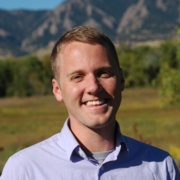Aaron Piña, AAAS Science and Technology Policy Fellow, NASA Headquarters, Washington, D.C.

Please include details about your educational background and what sparked your interest in atmospheric or related sciences.
I grew up on the coastal bend of Texas between Corpus Christi and Galveston, and I first became interested in the weather when Hurricane Brett made landfall on the Texas coast in 1999. Though Hurricane Brett did not impact my hometown, experiencing a direct hit from Hurricane Claudette in 2003 and witnessing a rare overnight snowfall of 10+ inches in 2004 solidified my interest in meteorology.
I started college in pursuit of a B.F.A. in Theatre at Texas Tech University and graduated with a B.Sc. in Meteorology (2011) from Texas A&M University. When I switched majors, my intention was to marry acting with science and go into broadcast meteorology. After a couple of summer internships in college, I ended up going to graduate school. I received my M.Sc. in Atmospheric Science (2013) at Colorado State University. I worked towards connecting science with policy and completed my Ph.D. in Ecology (2017) from Colorado State University.
What was your first job in the field and how did you end up in the job you are in now?
My first job was at a start-up small business outside of Denver, CO with a focus on atmospheric transport and dispersion applications prioritized by the Departments of Defense and Energy. The primary source of funding was through government contracts. Adding to my interest in connecting science with policy, I also became interested in how policy decisions at the federal level are influenced by science.
What opportunities did you pursue that you knew would be beneficial to securing a job in the profession?
I looked for various opportunities such as science communication, networking events, and learning about fields outside of my primary discipline. I took part in programs such as Colorado State University’s Sustainability Fellowship, American Meteorological Society’s Summer Policy Colloquium, NSF-sponsored interdisciplinary workshops, and numerous Climate Science Day on Capitol Hill events.
What other courses/skills beyond the required math and science courses do you think would be the most helpful to individuals wanting a career in your profession?
In most scientific fields, many transferable skills are developed. For instance, coding. In addition to atmospheric modeling, I took courses on economic and biologic modeling to understand how different fields utilize models.
Another useful skill that I did not realize until recently was convening and organizing sessions at large scientific conferences. It is good for students who plan to go into research to gain experience in organizing meetings related to topics of interest.
What is your typical day on the job like?
Every day is different, which I love. Much of my current job involves planning, organizing, and strategizing to advance weather research and technology. There are different phases of planning which could be at development stage or a late stage that is ready for deployment. For example, some of the days include talking with European partners on planning a tropical field campaign, and other parts involve reading and discussing the latest findings of research that was funded by NASA.
What do you like most about your job? What is the most challenging thing about your job?
I love that my work feels directly relevant and that not a day goes by without learning something new. I am able to connect science with decision making/policy at the institutional, intergovernmental, and international levels.
Does your job allow for a good work/life balance? If not, why?
There is a rather large learning curve, which I am still getting used to. So while there seems to be a front-end load of learning that can be time consuming, the job allows plenty of flexibility for a healthy work-life tradeoff.
Over the course of your career what is the most exciting thing that has happened to you?
One of the most exciting things was being part of a transdisciplinary team during my Ph.D. that won a Colorado Governor’s Award.
Is there anything you wish you had done differently in your career?
Although it may not matter much now, I wish I had pushed to get projects I started on earlier in my career published.
What are some ‘must haves’’ on a resume if a person wants to gain employment in your field?
People interested in science policy jobs should convey their personal endeavors in connecting science with society, experience communicating science to non-scientific audiences, and involvement or even leadership in extracurricular activities (e.g. serving on an AMS board!).